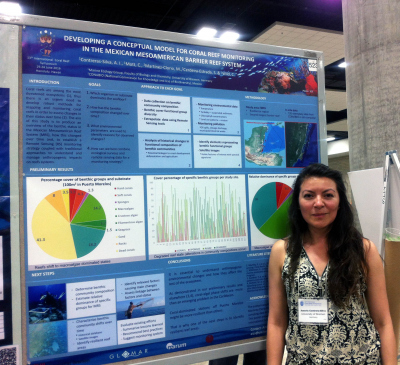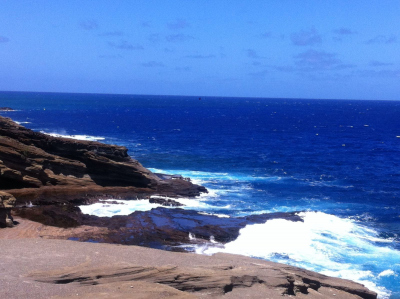Page path:
Ameris Contreras
Report of GLOMAR PhD student Ameris Contreras about her participation in the 13th International Coral Reef Symposium (ICRS) in Honolulu, Hawaii, USA from 19 - 24 June 2016
The International Coral Reef Symposium (ICRS) is only held every 4 years, and is the largest and main gathering of coral reef scientists in the world. The ICRS provides a platform for the most important findings and snapshot of the state of the art in coral reef science and research.
The ICRS 2016, included an increased focus on climate change and ocean acidification topics, as well as reef management and governance from the fields of conservation planning and policy management. Over the course of five days, from 8:00 am to 8:00 pm with a cheerful, warm, and open mood of work, the conference encompassed in oral, poster and plenary sessions, workshops, and specific group meetings. There was present a broad spectrum of coral reef science, that demonstrated a growing expansion from the biological and earth sciences to non-traditional disciplines, including the social sciences and economics as well as the growing application of remote sensing disciplines.
The Remote Sensing session was one of the biggest. This session was especially important for me since it is related to my PhD project. There was presented the newest research on remote sensing coral reefs by the most important researchers in this field. The talks were about new approaches on sustaining coral reef ecosystems and their fisheries; status of the world's coral reefs; underwater coral reef monitoring; 3D mapping; climate change monitoring. All these exiting themes were presented with the use of remote sensed technology. I was very impressed, because in this session I found out there is a big coral reef geosciences community; that actually is working to match the data sources, data structures, and analysis needs of the coral reef community with current advances in data science, visualization, and image processing from multiple disciplines in order to advance on coral reef research. This community is working together for the big challenge of conservation.
On June 21st I presented my poster contribution entitled 'Developing a Conceptual Model for Coral Reef Monitoring in the Mexican Mesoamerican Barrier Reef System' in the session: "Emerging science and technology". The poster session was the best opportunity for networking, it was not only a breakout session with attendees, junior and senior researchers walking around conversing with the expositors casually; but also the session extended three days, so I had the opportunity to present my work in a relaxed atmosphere for about one hour each day. While discussing my research project and exchanging cards I realized I had discussed my research project with senior scientists whose work has inspired mine in some way, and I also was able to put a face to a name, talked to the scientist whose papers I have been reading for years, and getting feedback and more ideas for my own project was not only excited and important, but also a rewarding experience.
On June 22 from 19:30 to 21:30, I also attended a Latin-American Reef encounter, which intention was to bring together all Latin American and Caribbean coral reef researchers with the goal to organize a Latin American Chapter of the International Society of Reef Studies (ISRS). With about 72 attendees between researchers, students, managers and non-governmental Organizations. The result of this meeting was the work on small teems organized by country and produce the first Latin American Coral Reef chapter on the ISRS including Spanish-written articles.
By the end of the event I attended mostly to four talk sessions. The resume overarching messages included the need to determine the ecological implications of phase shifts in coral reefs systems; develop methodologies to reveal the complex and cumulative effects of climate change; assess potential solutions to management issues that balance long-term and short-term benefits and encompass societal engagement in decision-making; and to establish cross-disciplinary dialogues to translate diverse scientific and social-scientific knowledge into innovative regulatory, social, and economic practice, but most important the need to act now if we want future generations to experience the wonder of coral reefs. The importance of a meeting with more than 2,500 other coral scientists focused to address the disconnection between scientists and politicians, helps funding the basis and priorities for a coral reef management not separate from the underlying socio-ecological, economic, and political problems that could determine not only the subsistence, but the permanence of this ecosystems.
Overall the entire trip as a PhD student at an early stage broadened my horizons as a coral scientist, I am very grateful to GLOMAR for supporting this conference trip, I can say that I will remember ICRS as one of my most encouraging learning experiences.
The ICRS 2016, included an increased focus on climate change and ocean acidification topics, as well as reef management and governance from the fields of conservation planning and policy management. Over the course of five days, from 8:00 am to 8:00 pm with a cheerful, warm, and open mood of work, the conference encompassed in oral, poster and plenary sessions, workshops, and specific group meetings. There was present a broad spectrum of coral reef science, that demonstrated a growing expansion from the biological and earth sciences to non-traditional disciplines, including the social sciences and economics as well as the growing application of remote sensing disciplines.
The Remote Sensing session was one of the biggest. This session was especially important for me since it is related to my PhD project. There was presented the newest research on remote sensing coral reefs by the most important researchers in this field. The talks were about new approaches on sustaining coral reef ecosystems and their fisheries; status of the world's coral reefs; underwater coral reef monitoring; 3D mapping; climate change monitoring. All these exiting themes were presented with the use of remote sensed technology. I was very impressed, because in this session I found out there is a big coral reef geosciences community; that actually is working to match the data sources, data structures, and analysis needs of the coral reef community with current advances in data science, visualization, and image processing from multiple disciplines in order to advance on coral reef research. This community is working together for the big challenge of conservation.
On June 21st I presented my poster contribution entitled 'Developing a Conceptual Model for Coral Reef Monitoring in the Mexican Mesoamerican Barrier Reef System' in the session: "Emerging science and technology". The poster session was the best opportunity for networking, it was not only a breakout session with attendees, junior and senior researchers walking around conversing with the expositors casually; but also the session extended three days, so I had the opportunity to present my work in a relaxed atmosphere for about one hour each day. While discussing my research project and exchanging cards I realized I had discussed my research project with senior scientists whose work has inspired mine in some way, and I also was able to put a face to a name, talked to the scientist whose papers I have been reading for years, and getting feedback and more ideas for my own project was not only excited and important, but also a rewarding experience.
On June 22 from 19:30 to 21:30, I also attended a Latin-American Reef encounter, which intention was to bring together all Latin American and Caribbean coral reef researchers with the goal to organize a Latin American Chapter of the International Society of Reef Studies (ISRS). With about 72 attendees between researchers, students, managers and non-governmental Organizations. The result of this meeting was the work on small teems organized by country and produce the first Latin American Coral Reef chapter on the ISRS including Spanish-written articles.
By the end of the event I attended mostly to four talk sessions. The resume overarching messages included the need to determine the ecological implications of phase shifts in coral reefs systems; develop methodologies to reveal the complex and cumulative effects of climate change; assess potential solutions to management issues that balance long-term and short-term benefits and encompass societal engagement in decision-making; and to establish cross-disciplinary dialogues to translate diverse scientific and social-scientific knowledge into innovative regulatory, social, and economic practice, but most important the need to act now if we want future generations to experience the wonder of coral reefs. The importance of a meeting with more than 2,500 other coral scientists focused to address the disconnection between scientists and politicians, helps funding the basis and priorities for a coral reef management not separate from the underlying socio-ecological, economic, and political problems that could determine not only the subsistence, but the permanence of this ecosystems.
Overall the entire trip as a PhD student at an early stage broadened my horizons as a coral scientist, I am very grateful to GLOMAR for supporting this conference trip, I can say that I will remember ICRS as one of my most encouraging learning experiences.




